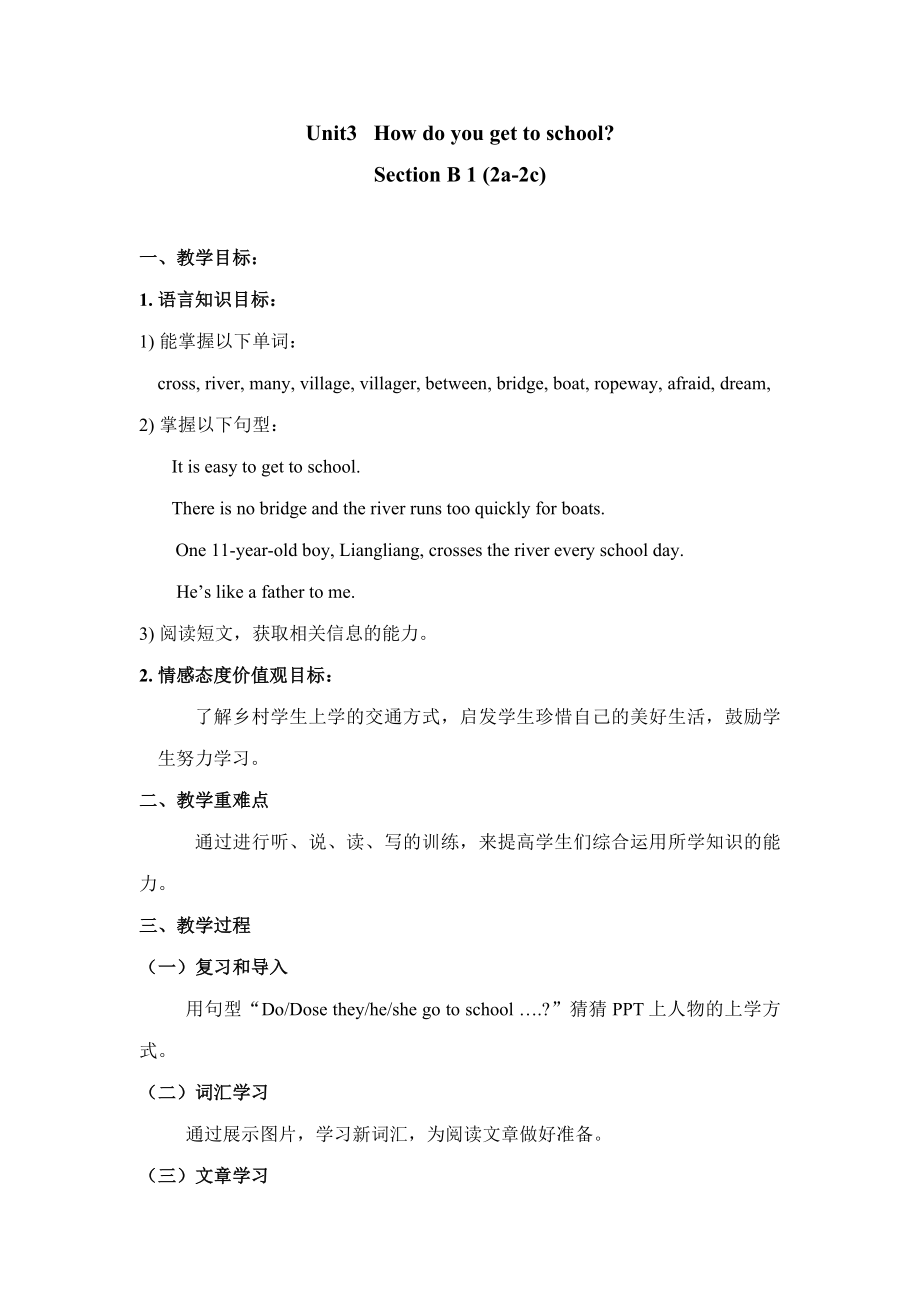《人教版英語(yǔ)七年級(jí)下冊(cè)Unit 3 How do you get to school_ Section B 2a—2c教案》由會(huì)員分享,可在線(xiàn)閱讀����,更多相關(guān)《人教版英語(yǔ)七年級(jí)下冊(cè)Unit 3 How do you get to school_ Section B 2a—2c教案(3頁(yè)珍藏版)》請(qǐng)?jiān)谘b配圖網(wǎng)上搜索�。
1����、Unit3 How do you get to school?
Section B 1 (2a-2c)
一���、教學(xué)目標(biāo):
1. 語(yǔ)言知識(shí)目標(biāo):
1) 能掌握以下單詞:
cross, river, many, village, villager, between, bridge, boat, ropeway, afraid, dream,
2) 掌握以下句型:
It is easy to get to school.
There is no bridge and the river runs too quickly for boats.
One 11-year-ol
2��、d boy, Liangliang, crosses the river every school day.
He’s like a father to me.
3) 閱讀短文�,獲取相關(guān)信息的能力�����。
2. 情感態(tài)度價(jià)值觀(guān)目標(biāo):
了解鄉(xiāng)村學(xué)生上學(xué)的交通方式�,啟發(fā)學(xué)生珍惜自己的美好生活,鼓勵(lì)學(xué)生努力學(xué)習(xí)����。
二、教學(xué)重難點(diǎn)
通過(guò)進(jìn)行聽(tīng)���、說(shuō)���、讀、寫(xiě)的訓(xùn)練,來(lái)提高學(xué)生們綜合運(yùn)用所學(xué)知識(shí)的能力����。
三、教學(xué)過(guò)程
(一)復(fù)習(xí)和導(dǎo)入
用句型“Do/Dose they/he/she go to school ….?”猜猜PPT上人物的上學(xué)方式���。
(二)詞匯學(xué)習(xí)
通過(guò)展示
3�、圖片�,學(xué)習(xí)新詞匯,為閱讀文章做好準(zhǔn)備���。
(三)文章學(xué)習(xí)
1. 閱讀前:Look at the picture and title(題目) below. Guess(猜) what the passage(文章) is about.
2.閱讀中:
(1)Fast reading
How do the students in the village go to school?
Why do they go to school like this?
Does the boy like this school? Why?
What’s the villagers’ dream
4�、? Do you think their dream can come true? Why or why not?
(2)Careful reading
Read the passage again. Complete the sentences with the words from the passage.
For the students in the village, it is ________ to get to the school.
They have to cross a very _____ river between their school and the
5�����、 village.
They cannot go by boat because the river runs too _________.
It is not easy to cross the river on a ropeway, but the boy is not _______.
The students and villagers want to have a bridge. Can their dream come _____?
3.閱讀后
聽(tīng)課文��,劃難點(diǎn)�����,講解知識(shí)點(diǎn)�����。
(1)It is easy to get to school.
It is +形容詞+
6、to do sth意為做某事是.......
句中it是形式主語(yǔ)�����,to get to school是真正的主語(yǔ)���。
(2)There is no bridge and the river runs too quickly for boats.
①此句是英語(yǔ)否定結(jié)構(gòu)的一種。當(dāng)no用于構(gòu)成否定句��,主要用于名詞之前�����,強(qiáng)調(diào)否定其后的名詞�,表示“完全不;根本沒(méi)有”���。
②run 表示“液體的流動(dòng)”�����,在不同的語(yǔ)境中有不同的用法和含義���。
(3)One 11-year-old boy, Liangliang, crosses the river every school day.
①year 年
7�、�����;年紀(jì)
②11-year-old boy中11-year-old是一個(gè)復(fù)合形容詞����,作定語(yǔ),修飾名詞boy����,意為“11歲的”。由“數(shù)詞-名詞-(形容詞)”構(gòu)成的復(fù)合形容詞中����,名詞只能用單數(shù)。
(4)He’s like a father to me.
like “像”��。作介詞�����,不是動(dòng)詞��。
練習(xí):
1、It’s good_____ breakfast everyday.
A. have B.to have C.having D.had
2����、He is _____ and he has an _____ sister.
A. ten-year-old, 8 years old
B. ten years old, 8-year-old
3 、This twin sisters are very _____.
A. look like B. be like C.like
四. 作業(yè)
1.背誦書(shū)17頁(yè)短文����;
2.預(yù)習(xí)并完成書(shū)18頁(yè)3a選詞填空;
板書(shū)設(shè)計(jì):
Unit3 How do you get to school?
1. It is +形容詞+to do sth
2. “數(shù)詞-名詞-(形容詞)” 復(fù)合形容詞 (名詞用單數(shù))
3. be like 像
 人教版英語(yǔ)七年級(jí)下冊(cè)Unit 3 How do you get to school_ Section B 2a—2c教案
人教版英語(yǔ)七年級(jí)下冊(cè)Unit 3 How do you get to school_ Section B 2a—2c教案

